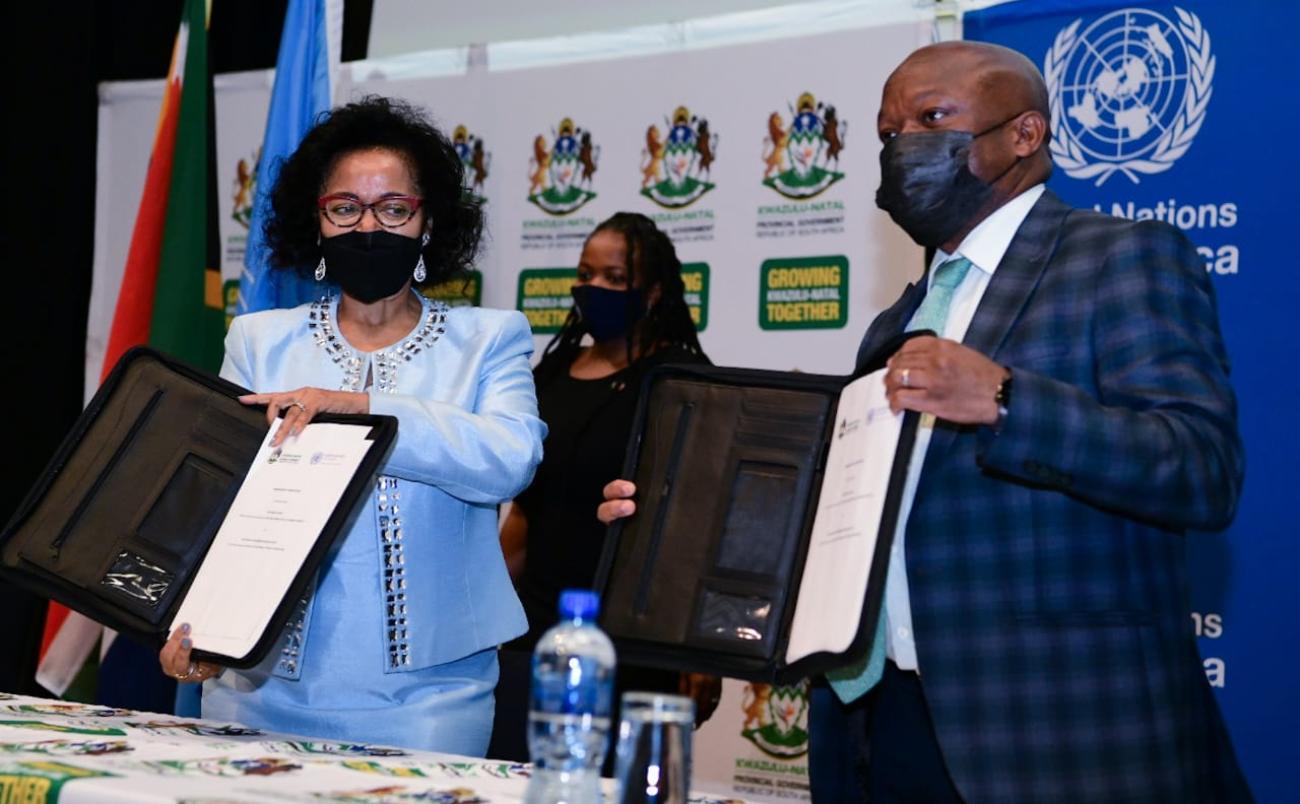The KwaZulu-Natal Provincial Government’s rebuilding efforts have received a much-needed boost following the United Nations’ pledge of R20-million in catalytic resources. This includes R10 million to support educational interventions, R7 million for social cohesion dialogues and R2 million to support Gender-Based Violence shelters in the province.
To give effect to this intervention, KwaZulu-Natal Premier Sihle Zikalala and the Resident Coordinator and Head of the United Nations in South Africa, Ms Nardos Bekele-Thomas today signed a Memorandum of Understanding (MoU) which identifies priority areas in which the province and the UN will collaborate to assist communities and entities as part of the rebuilding efforts.
Speaking during the historic MoU signing ceremony, Premier Zikalala said: “Our partnership with the United Nations is critical in our provincial efforts of building enduring peace and advancing sustainable development where no one is left behind. As we strengthen our law enforcement and put in place plans to mitigate future occurrences, we also agree that we need to get to the root causes of anti-social behaviour in KwaZulu-Natal and indeed in our country. In this regard, we share the sentiment by the UN Resident Coordinator that, “People need a stake in the economy because then they will protect it, not destroy it,” said Premier Zikalala.
“We appreciate that the UN has pledged its support to the Provincial Government of KwaZulu-Natal to assist in rebuilding affected communities and to address the underlying causes of the complex developmental landscape in the province. On my part as Co-Chair of the Provincial Steering Committee with the UN Resident Coordinator, I commit to ensure that the spirit and intent of the MoU is translated into tangible benefits that will promote sustainable development, heal our people, unite them, and restore their dignity,” said Premier Zikalala.
Premier Zikalala also said while before we used to speak of the Fourth Industrial Revolution, times have changed and presented a set of new challenges following the advent of the Covid-19 pandemic.
“We are now no longer required to fly to Johannesburg for a one-hour meeting anymore, because we are dealing with a new world after Covid-19. It is important that as we adapt to this new world we do not leave the majority behind. The economy that we rebuild after the coronavirus pandemic should be one that is inclusive. You will note that we are now speaking about inclusive growth. For a long time this country had growth of about 3%, but the challenge is that the growth did not include job creation,” said Premier Zikalala.
In her remarks at the signing ceremony, Ms Bekele-Thomas said the MoU “marks the next stage of our relationship with the Provincial Government of KwaZulu-Natal and its people and speaks to the commitment we made to the Government of South Africa, through the Department of Cooperative Governance and Traditional Affairs, to further the national developmental agenda at a subnational level.”
Ms. Bekele-Thomas called on the Government, the UN, business leaders and the civil society to work hand in hand with local communities “If we do not face the truth of what happened, if we return to business as usual then we will fail, and it will be on our shoulders,” she warned.
Ms. Bekele-Thomas said the intentions of the support the United Nations wishes to provide through this MoU is to complement the ongoing efforts of the Provincial Government while ensuring that the duplication of efforts is avoided.
“To demonstrate our commitment to the Emergency Response Plan, the United Nations family in South Africa, we are committing more than R20 million as catalytic resources to support the implementation of this programme. This includes R10 million to support educational interventions, R7 million for social cohesion dialogues through community radio stations and R2 million to support GBV shelters in the province. I want to challenge the private sector to, at the very least, match our initial funding and I look to all our partners to share their knowledge, experience, resources, and to contribute to our planning and implementation,” said Ms Bekele-Thomas.
CEO of the Durban Chamber of Commerce and Industry Ms Palesa Phili facilitated the private sector engagements and pledges to drive economic inclusivity in the province.
Following the July civil unrest, a delegation from the United Nations in South Africa, led by Ms Bekele-Thomas, visited the province to assess the impact of the damage and destruction that left many communities and businesses reeling. During the visit, the UN delegation met with Premier Zikalala and key officials which culminated in the formation of a joint UN and KZN Task Team.
For the past few weeks, the joint task team has been engaged in extensive consultations to understand the key priority areas, which then resulted in the drafting of the MoU between the KZN Office of the Premier and the UN in South Africa.
As agreed between the two parties, the immediate actions consist of an Emergency Response Plan addressing the impacts of the unrest. This includes the medium-to long-term actions which focus on proactive measures to be undertaken that address the underlying causes of the civil unrest. The implementation plan is in alignment with the themes of the Provincial Medium-Term Strategic Framework and the UN Sustainable Development Cooperation Framework (2020-2025).
The UN has worked with the KwaZulu-Natal Office of the Premier to identify priority areas and take action on in the areas of food security, gender-based violence and education. The two partners will also “work with the civil society to help heal wounds, build bridges, and to frustrate those voices that advocate violence over dialogue.”
The Resident Coordinator was accompanied by several heads of UN agencies operating in South Africa.
ENDS


















